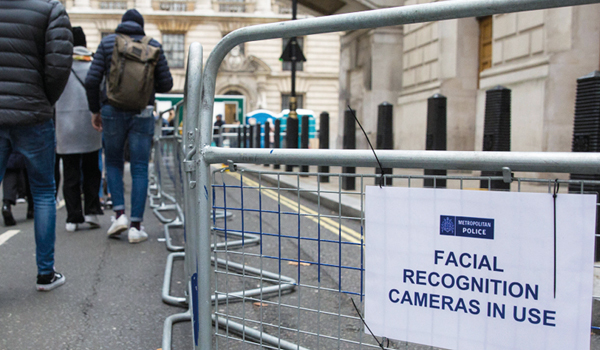Home Office looking to expand use of facial recognition technologies
The Home Office is looking to increase the use and effectiveness of facial recognition technologies within UK policing and the security sector.
The Defence and Security Accelerator (DASA) has launched a new market exploration on behalf of the Home Office to source technologies for the use of facial recognition.
It is looking to identify higher ‘Technology Readiness Level’ (TRL) capabilities that could be deployed to benefit the Home Office and policing within the next 18 months.
The Home Office says facial recognition is an “increasingly important capability” for law enforcement and is already being used in a number of ways within UK policing and security settings to prevent and detect crime, enhance security, find wanted criminals, safeguard the vulnerable and protect people from harm.
It added: “The use of facial recognition technologies is at varying stages across UK policing and the use of this technology in an ethical and effective way is a priority for the Home Office.”
The Minister of State for Crime, Policing and Fire and Professor Paul Taylor, National Policing Chief Scientific Adviser, have jointly supported progressing the use of this technology.
“The Minister of State for Crime, Policing and Fire and I strongly support the development and implementation of facial recognition technology within the law enforcement sector and are encouraged by its potential,” said Professor Taylor.
“We firmly believe that embracing this advanced technology can significantly enhance public safety while respecting individual rights and privacy. Industry is pivotal to realisation of that mission.
“It is essential to acknowledge the concerns surrounding facial recognition technology, particularly those relating to privacy and potential biases. However, responsible development and implementation of facial recognition systems can address these concerns effectively.
“By establishing robust governance frameworks, implementing strict data protection protocols, and ensuring transparency and accountability, we can strike the right balance between public safety and individual privacy rights.”
He added: “To maximise the technological benefits and minimise the risks associated with facial recognition, it is crucial that we support and encourage industry to continue developing capabilities which can be deployed effectively and ethically.”
However, civil liberties campaign group Big Brother Watch said plans to expand the use of what it describes as an “Orwellian mass surveillance tool” was disturbing.
Silkie Carlo, director of Big Brother Watch said: “It’s disturbing and deeply undemocratic that the Government is planning to expand facial recognition surveillance in the UK.
“This is an Orwellian mass surveillance tool rarely seen outside of Russia and China and has absolutely no place in Britain.
“The Government has no mandate at all to do this and the fact that the rest of the democratic world is legislating to ban live facial recognition surveillance shows just how backwards the Home Office’s approach to this is.
“Live facial recognition has the potential to invade the privacy of millions of Brits and turn us into walking ID cards living in a surveillance state.
“It is totally unnecessary, unConservative and unBritish, and the Policing Minister would do best to focus on fixing our broken law enforcement rather than spending taxpayers’ money on dystopian, experimental software.”
The Home Office says it is primarily interested in higher TRL innovative capabilities that can resolve identity using facial features and landmarks as well as technologies that support algorithm development, integration, and analytics.
“It is vital that proposed solutions are secure, accurate, explainable and free from bias,” the Home Office said.
Primarily it is looking for solution to support:
- Retrospective facial recognition (RFR), a system to be used after an event to help establish who a person is or whether their image matches against other media held on image databases;
- Operator-initiated facial recognition (OIFR), a system where an operator can decide that they need to take an image of a person and then use FR software to help them establish who that person is; and
- Live facial recognition (LFR), a system where cameras are focused on a specific area – when people pass through that area their images are streamed directly to the LFR system.
The Home Office said the market exploration is not seeking technologies beyond the resolution of identity through facial recognition camera systems, such as iris detection, gait analysis and object detection.
Submissions must be submitted by midday on October 12, 2023.


